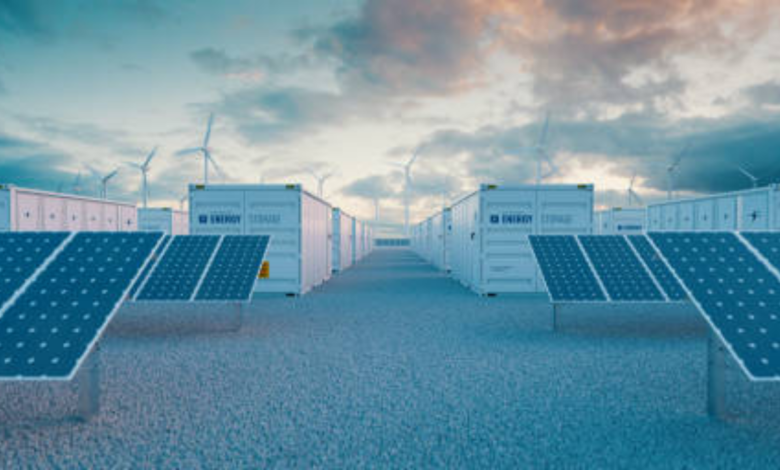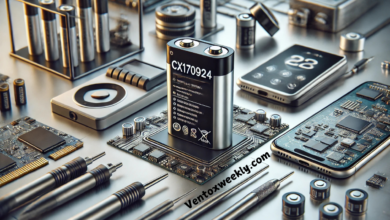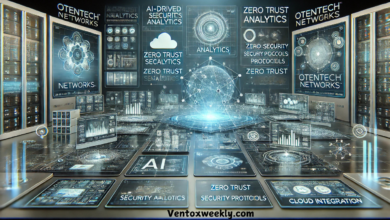Why Lithium-Ion Battery Power Stations Are the Ultimate Energy Solution

In recent years, energy storage technology has seen remarkable advancements, with lithium-ion battery power stations leading the charge in portable, efficient, and sustainable energy solutions. These power stations are transforming the way we think about energy storage, providing a reliable alternative to traditional generators, offering portable power for remote locations, and serving as backup solutions for homes and businesses. Whether you’re camping in the wilderness, dealing with a power outage, or seeking an eco-friendly solution to power your devices, lithium-ion battery power stations are becoming the go-to option for many. This article will explore why these battery-powered stations are quickly becoming the ultimate energy solution.
What Is a Lithium-Ion Battery Power Station?
Understanding the Basics
A lithium-ion battery power station is a portable energy storage device that uses lithium-ion batteries to store electrical energy. These power stations are equipped with multiple outlets and ports, allowing users to charge or power a variety of devices, from smartphones to larger appliances. Unlike traditional gas-powered generators, lithium-ion battery power stations use clean, renewable electricity, making them an eco-friendly alternative to conventional energy sources.
These power stations typically consist of the following components:
- Lithium-Ion Batteries: The core of the power station, these rechargeable batteries store the energy that is either generated or plugged into the device.
- Inverters: The inverter converts the stored DC (direct current) electricity into AC (alternating current) to power household appliances.
- Charging Ports: Multiple charging ports and outlets for charging devices such as phones, laptops, lights, or even electric grills.
- Solar Panel Input: Some lithium-ion power stations can be charged using solar panels, providing an additional clean energy charging method.
Advantages of Lithium-Ion Battery Power Stations
1. Efficiency and Longevity
One of the most significant advantages of lithium-ion battery power stations is their efficiency. Lithium-ion batteries are known for their high energy density, meaning they can store more energy in a smaller, lighter package. Compared to traditional lead-acid batteries, lithium-ion batteries last significantly longer, with many offering a lifespan of 10 years or more with proper care.
How Longevity Benefits Users
Lithium-ion power stations can deliver consistent power for extended periods without significant degradation. This is a major improvement over older technologies, which lose capacity quickly over time. For users, this means fewer replacements, more value for money, and a longer-lasting solution for their energy needs.
2. Portability and Convenience
Lithium-ion battery power stations are lightweight and compact, making them incredibly portable. This portability allows users to take the power station on camping trips, outdoor adventures, or use it as a backup power source in case of a power outage.
Easy to Transport
Most lithium-ion power stations are designed to be easy to carry, with handles or even wheels for larger models. This makes them ideal for outdoor enthusiasts who need a reliable source of energy when far from traditional power sources. Additionally, their compact size makes them less obtrusive in small spaces like RVs or apartments.
3. Eco-Friendly and Clean Energy
Unlike traditional gas-powered generators, which emit harmful pollutants into the environment, lithium-ion battery power stations provide a clean, green alternative. They can be charged using renewable energy sources like solar panels, making them a fully sustainable solution.
Solar Charging Compatibility
Many lithium-ion power stations come with solar panel compatibility, which allows users to charge the power station through solar energy. This feature is particularly useful for off-grid living or outdoor activities where access to conventional power sources is unavailable. Solar-powered charging not only reduces the carbon footprint but also helps save on electricity costs in the long run.
4. Quiet Operation
One of the most noticeable differences between lithium-ion battery power stations and traditional generators is the level of noise. Gas-powered generators can be incredibly noisy, which can disrupt outdoor activities or be an annoyance during a power outage. Lithium-ion battery power stations, on the other hand, operate almost silently.
Quiet and Peaceful
Because they don’t have internal combustion engines like gas-powered generators, lithium-ion power stations produce little to no noise while in operation. This makes them perfect for use in residential areas, camping trips, or during outdoor events where noise may be a concern.
5. Safety Features
Lithium-ion battery power stations come with several built-in safety features that protect both the user and the device. Overcharge protection, short circuit protection, and temperature regulation are just a few of the safety measures that come standard with most lithium-ion power stations.
Protection from Overcharging
Lithium-ion batteries are sensitive to overcharging, which can lead to a decrease in battery life or even cause safety hazards. Thankfully, many power stations come with built-in overcharge protection, ensuring that the battery is not overcharged and stays in optimal working condition.
6. Cost-Effective Long-Term Solution
While lithium-ion battery power stations can have a higher initial cost compared to gas-powered generators, they are much more cost-effective in the long run. With no fuel costs, minimal maintenance requirements, and long battery life, users can save money over time.
Saving on Fuel and Maintenance Costs
Gas-powered generators require regular fuel purchases, as well as oil changes, air filter replacements, and other maintenance tasks. Lithium-ion power stations, however, require minimal upkeep, and users only need to recharge them when the battery is running low. This cost-saving feature makes lithium-ion battery power stations a smart investment for the long haul.
Applications of Lithium-Ion Battery Power Stations
1. Emergency Backup Power
Power outages can happen unexpectedly due to storms, natural disasters, or equipment failures. In these cases, a lithium-ion battery power station can provide an immediate source of backup power for essential devices, including lights, refrigerators, medical equipment, and communication devices.
Quick and Reliable Backup
With a lithium-ion battery power station, you don’t have to worry about running out of fuel during an outage. Simply plug in your devices and use the stored energy until power is restored. Because of their efficiency and long battery life, these devices are highly dependable during emergencies.
2. Outdoor and Recreational Use
Outdoor enthusiasts, campers, RV owners, and boaters can all benefit from a lithium-ion power station. These power stations allow users to power devices like lights, laptops, cooking equipment, and even small refrigerators while off the grid.
Energy for Remote Adventures
Whether you’re camping in the wilderness or spending a weekend in an RV, having a portable power station can make your experience much more enjoyable. These stations provide a reliable power source for everything from charging phones to cooking meals, without the need for gasoline or noisy generators.
3. Off-Grid Living
For individuals who live off the grid, a lithium-ion battery power station can be an essential component of their energy setup. Paired with solar panels, these stations can provide a continuous supply of clean energy without relying on the traditional grid.
Sustainable Energy Solutions
Off-grid living requires a reliable energy solution, and lithium-ion battery power stations are a perfect fit. With the ability to store solar energy, these stations provide an independent and sustainable power source that can operate year-round, regardless of grid access.
How to Choose the Right Lithium-Ion Battery Power Station
When selecting a lithium-ion battery power station, consider the following factors:
1. Capacity and Wattage Needs
The power station’s capacity, measured in watt-hours (Wh), determines how much energy it can store. Assess your power needs and choose a station with the appropriate capacity to meet those needs. If you plan to run high-powered devices like refrigerators or power tools, opt for a model with higher wattage.
2. Number of Outlets and Ports
Check the number and types of outlets available. Ensure that the power station has the appropriate ports for your devices, whether you need USB ports, AC outlets, or DC inputs.
3. Charging Time and Input Options
Consider how long it takes to charge the power station fully and whether it supports charging via solar panels, wall outlets, or car chargers. Solar charging can be a game-changer if you plan to use the power station off-grid.
4. Portability and Weight
For those who need to move their power stations around, portability is important. Ensure that the power station is lightweight and easy to carry or transport.
Conclusion
Lithium-ion battery power stations are revolutionizing the way we think about energy storage and portability. With their efficiency, long-lasting performance, eco-friendly operation, and quiet performance, they offer a range of benefits for anyone seeking reliable, clean, and cost-effective energy solutions. Whether you’re powering your home during an outage, camping in the great outdoors, or living off the grid, lithium-ion battery power stations are the ultimate energy solution for the modern world.




